|
|
|
Sort Order |
|
|
|
Items / Page
|
|
|
|
|
|
|
| Srl | Item |
| 1 |
ID:
167677
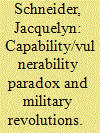

|
|
|
|
|
| Summary/Abstract |
The Information Revolution, or the rise in computing power, allowed states to leverage digital capabilities to exert conventional military dominance. But does it also create vulnerabilities that lead to war? In this piece, I examine the relationship between military revolutions and conflict initiation and identify a capability/vulnerability paradox that suggests the degree of capability dependence created by a military revolution combined with the ability of adversaries to exploit vulnerabilities creates potential pockets of dangerous instability. These indicators suggest that greater centralisation and data dependencies could move the Information Revolution towards incentives for instability.
|
|
|
|
|
|
|
|
|
|
|
|
|
|
|
|
| 2 |
ID:
109910
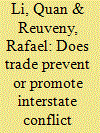

|
|
|
|
|
| Publication |
2011.
|
| Summary/Abstract |
Competing theories argue, respectively, that more trade reduces, increases, or does not affect interstate military conflict. We offer a new general theory on how trade affects conflict, which encompasses the liberal logic and the neo-Marxist/neo-mercantilist mechanism of asymmetric dependence and offers alternative explanations to the effects predicted by the bargaining and classical realist approaches. If a country expects its conflict toward a target to reduce the price of its import from or increase the price of its export to a target, it has an economic incentive to initiate conflict, and vice versa. These expectations can vary across trade flow directions and economic sectors. Using our model, we predict the effects of increases in exports and imports in five sectors on military conflict initiation. Statistical analysis of directed dyads from 1970 to 1997 largely supports our predictions. Rises in the initiator's imports of agriculture/fishery, energy, and chemical/mineral goods and exports of miscellaneous consumption goods reduce the likelihood of conflict initiation; rises in the initiator's exports of energy and both imports and exports of manufactured goods increase the likelihood. We evaluate implications for the literature and public policy.
|
|
|
|
|
|
|
|
|
|
|
|
|
|
|
|
| 3 |
ID:
140282
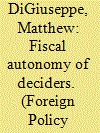

|
|
|
|
|
| Summary/Abstract |
Liberal theory claims that the constraint taxpayers impose on military expenditure is an important mechanism through which democracy and international commerce help prevent conflict. However, leaders with affordable access to sovereign credit have often overcome this constraint by raising revenue on credit markets. By minimizing or deferring the economic burden imposed on taxpayers and the macroeconomic stress associated with alternative financing strategies, I argue that these leaders have greater autonomy to pursue an aggressive foreign policy if they so desire. Leaders that lack creditor confidence risk increased political opposition and removal from office if hostilities generate macroeconomic stress or disturb the domestic fiscal balance. They also face a higher likelihood of defeat or retreat, and the subsequent political consequences, if they pursue conflict without sufficient resources. Estimates of a heteroskedastic probit model support this hypothesis and indicate that creditworthy states initiate conflict with a greater mean probability and greater variance than their noncreditworthy counterparts.
|
|
|
|
|
|
|
|
|
|
|
|
|
|
|
|
| 4 |
ID:
192528


|
|
|
|
|
| Summary/Abstract |
International relations theory has long suggested that uncertainty during militarized crises pushes states to adopt escalatory behavior. However, the leadup to the Russo-Ukrainian War challenges this view, with Kyiv downplaying the risk of conflict and adopting a cautious foreign policy. I argue that Ukrainian behavior in the leadup to the war demonstrates the need to disaggregate between types of uncertainty. While uncertainty over an adversary’s intentions and capabilities can push a state to adopt escalatory behavior, uncertainty regarding a potential adversary’s military strategy and regarding the level of support it can expect from third parties incentivizes a state to assume a more cautious posture. The piece concludes with a reflection on disciplinary blind spots regarding the impact of uncertainty on state decision-making and offers suggestions for overcoming them.
|
|
|
|
|
|
|
|
|
|
|
|
|
|
|
|
| 5 |
ID:
154936
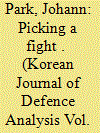

|
|
|
|
|
| Summary/Abstract |
Research shows that autocracies as well as democracies have reasons to avoid
strong enemies. What, then, make democracies distinctive from autocracies
in conflict selection? A critical difference may lie in the normative constraints
democracies experience. Focusing on the roles of public sentiment and liberalism,
we argue that democrats bearing high levels of accountability are less likely to
choose armed conflict without justifiable causes. We assess the roles of three liberal
factors in regard to the characteristics of target countries: respect of human rights,
democratic representation, and economic interdependence. Material factors, such
as relative military capability and geographic constraints are also considered.
The results show that both autocracies and democracies tend to attack easier
foes, but democracies avoid attacking countries that respect human rights and are
economically interdependent. Additionally, unlike autocracies, democracies do not
view other democracies as attractive targets of military attacks.
|
|
|
|
|
|
|
|
|
|
|
|
|
|
|
|
| 6 |
ID:
158994
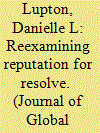

|
|
|
|
|
| Summary/Abstract |
Scholars remain conflicted over the effects of reputations for resolve on international conflict and which actors acquire these reputations. I address this debate by examining how our measures of resolve, as well as where we look for its effects, influence our conclusions about its impact on international conflict. Using data from the Archigos dataset and the International Crisis Behavior dataset, I perform a semi-parametric Cox survival analysis and directly compare the effects of resolute and irresolute behavior at two distinct levels of analysis: the leader level of analysis and the state level of analysis. My results show that target leaders who employ relatively more violent or more severe major responses to dispute triggers enjoy significantly longer periods of time before being the target of a future dispute initiated by the same challenger leader. While I also find a similar effect for target states that employ relatively more severe responses, the impact of resolute behavior at the state level of analysis does not appear to be as consistently widespread as that of resolute behavior at the leader level of analysis. My findings also show that how scholars choose to measure resolve as a concept can have important implications for their conclusions about its broader effects. Finally, my analyses present evidence that both leaders and states may be capable of acquiring reputations for resolve, opening up interesting avenues of future research.
|
|
|
|
|
|
|
|
|
|
|
|
|
|
|
|
| 7 |
ID:
133717
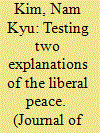

|
|
|
|
|
| Publication |
2014.
|
| Summary/Abstract |
Considerable evidence suggests that economic interdependence and integration reduce the likelihood of militarized conflict. However, scholars have devoted remarkably scant attention to testing different explanations of the liberal peace. This article offers an empirical test that can help adjudicate the two main arguments on the liberal peace: the opportunity cost and signaling arguments. Under the incomplete information assumption, I derive different observable implications of the competing arguments regarding how target states respond when challenged. By estimating selection models comprising dispute initiation and reciprocation, I find that, as challengers are more dependent on bilateral trade, targets are less likely to reciprocate disputes, which is supportive of the signaling argument. Regarding dispute initiation, increases in foreign direct investment and financial openness are associated with a decrease in the probability of conflict initiation. Last, the pacifying effects of the liberal economic variables are much more pronounced in contiguous and major dyads than in other dyads.
|
|
|
|
|
|
|
|
|
|
|
|
|
|
|
|
| 8 |
ID:
132323
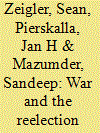

|
|
|
|
|
| Publication |
2014.
|
| Summary/Abstract |
This article investigates the relationship between term limits and international conflict. Theories of political survival and diversionary war both imply term limits should play a role in international relations, whereas "permanent referendum theory," largely motivated by work in American politics, suggests otherwise. Drawing on these theories, we formulate and test competing hypotheses regarding term limits and international crises. Using dyadic militarized interstate disputes data and information on forty-eight democracies with term limits, we uncover strong evidence to support the claim that leaders reaching final terms in office are more likely to initiate conflict than those still subject to reelection. Moreover, we find that the likelihood of conflict initiation is significantly higher during times of recession, but only in the absence of binding term limits. While binding electoral terms and economic downturns are both independently associated with increased levels of conflict initiation, in concert their conditional effects actually counteract each other.
|
|
|
|
|
|
|
|
|
|
|
|
|
|
|
|
|
|
|
|
|